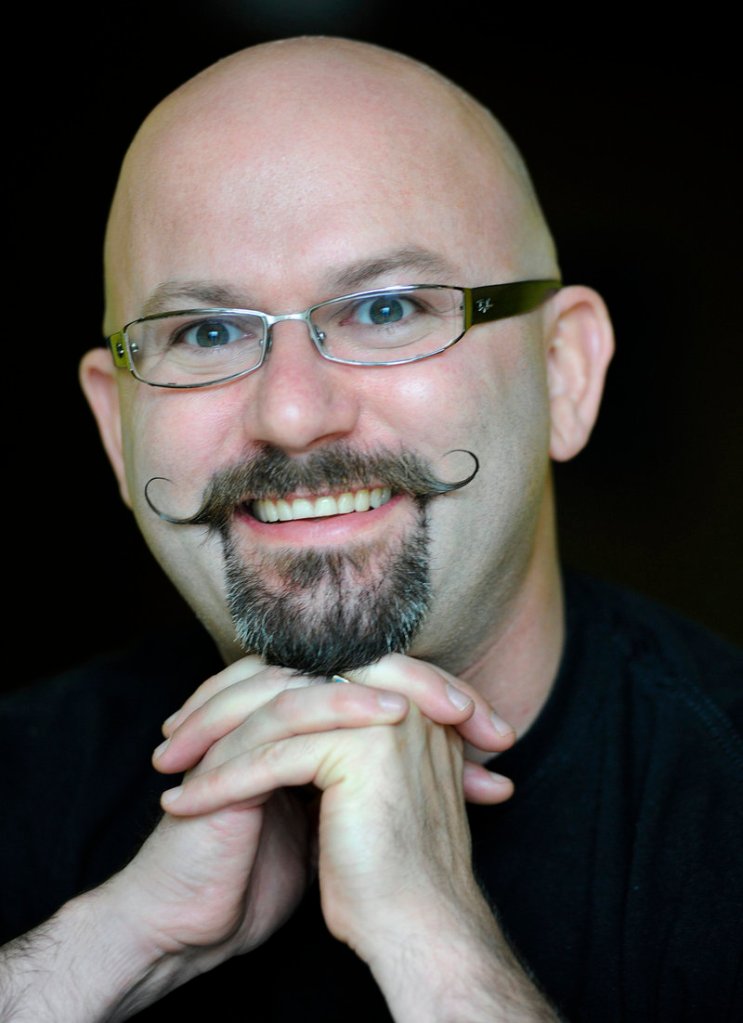Whether you call it a lip sweater, a mouth brow, a soup strainer or a plain old ‘stache, the mustache as a fashion statement has seen hard times.
The cold, cruel currents of popular culture have dubbed it a porn ‘stache and linked it to notorious dictators and creepy van drivers. But a Portland chiropractor with a handlebar ‘stache is one of a growing group of men doing his part to bring the mustache back to a position of respect.
Dr. Lou Jacobs is among 19 finalists in the third annual Robert Goulet Memorial Mustached American of the Year contest. This national competition pits him against a heavy-hitter lineup of mustached Americans that includes North Dakota Gov. John Hoeven, Morgan Spurlock of “Super Size Me” fame, Fox Sports Radio host Pat O’Brien and Minnesota Twins pitcher Carl Pavano.
“I need people from here to vote and vote often,” Jacobs said.
And in case you think Jacobs wants to win just for the glory that comes from landing such a prestigious award, he actually has an ulterior motive: He’s seeking publicity for his My Stache Fights Cancer fundraising campaign.
The idea for the fundraiser was born after Jacobs’ mother was diagnosed with inflammatory breast cancer. She passed away in May, which was around the time his dad was diagnosed with leukemia.
“I wanted to set up something that’s not exercise related,” Jacobs said. “Because most cancer fundraisers are walks, runs, treks, tris or bikes. I wanted to reach a different demographic of young guys, hipsters, biker guys, musicians and a lot of the people I attract to my practice.”
In contrast to most cancer fundraisers, which raise money for research into possible treatments, Jacobs is interested in raising awareness about the disease and prompting people to investigate the causes and focus more on prevention.
“The diagnosis rate right now is one in two people,” Jacobs said. “And the numbers keep getting worse. Treatment is very important if it keeps people alive a little longer. But one of the things we need to do is look at our lifestyle in this country and see how it differs from other countries (with lower cancer rates).”
So far, the campaign has brought in $1,465 for the Cancer Community Center in South Portland and inspired a number of other local guys to set up their own My Stache Fights Cancer fundraising pages. If the amount of money raised tops $5,000, half of it will be donated to the national Inflammatory Breast Cancer Foundation.
Dr. Aaron Perlut chairs the nonprofit American Mustache Institute, which employs eight full-time staffers in St. Louis and hosts the annual competition. He explained that the Mustached American of the Year contest was created to honor “mustached Americans who are doing great things. Clearly, Dr. Jacobs is a reflection of that with his effort to raise money for cancer.”
In September, the institute received more than 350 nominations for the award, including multiple nominations for Jacobs. The award is named for Goulet, a legendary singer and actor who proudly sported a mustache until he passed away in 2007.
In case you’re wondering what kind of doctorate Perlut possesses, that would be a doctor of nuclear mustachology.
This sense of humor permeates everything that the institute does, even when tackling such serious issues as what Perlut calls the “repeated pattern of discrimination against mustached Americans.”
Perlut said the downfall of the mustache happened at the close of the disco era.
“In the ’70s, nearly every American man had three things: a perm, a turtleneck and a mustache,” Perlut said. “The 1970s were the glory years for people of mustached-American heritage.”
But the following decade was not as kind to those with lower nose foliage. “The ’80s saw American culture become a much more clean-cut culture,” Perlut said. “Mustaches became somewhat of a joke.”
But the times, they are a-changin’.
“In 2004, 2005, we started to see a much more subtle change in the appreciation for the mustache,” Perlut said. Now, college students, 20-somethings and hipsters often see a mustache as a “form of self-expression.”
Jacobs said he hasn’t encountered any mustache discrimination in the Pine Tree State and, in fact, has been approached by numerous strangers who tell him to keep it up.
“I think Maine is a very mustache-friendly state,” Jacobs said. “I’ve received almost nothing but praise.”
With any luck, Jacobs will parlay Maine’s facial-hair-accepting ways into the coveted title of Mustached American of the Year.
Staff Writer Avery Yale Kamila can be contacted at 791-6297 or at: akamila@pressherald.com
Copy the Story Link
Send questions/comments to the editors.



Success. Please wait for the page to reload. If the page does not reload within 5 seconds, please refresh the page.
Enter your email and password to access comments.
Hi, to comment on stories you must . This profile is in addition to your subscription and website login.
Already have a commenting profile? .
Invalid username/password.
Please check your email to confirm and complete your registration.
Only subscribers are eligible to post comments. Please subscribe or login first for digital access. Here’s why.
Use the form below to reset your password. When you've submitted your account email, we will send an email with a reset code.